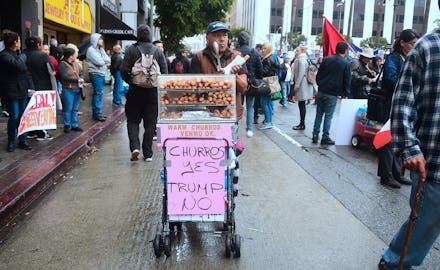Selling street food is no longer a crime in California, easing fears of jail time and deportation

Undocumented immigrant Marcelina Rios, a mother of four, was arrested in October 2017 in Rancho Cucamonga, California, for selling corn at a local park. She was released but immediately taken into custody by U.S. Immigration and Customs Enforcement agents, after which she was detained in an immigration detention center for six months, the Inland Valley Daily Bulletin first reported.
“I never thought that a day selling corn could lead to my being torn from my family and nearly deported,” Rios said in a statement.
California street vendors have long advocated for legalization of their work, citing harassment by police and penalties that include fines and even jail time for illegal street vending. But recent legislation means California’s streets could become a safer place for street vendors across the state.
According to a report by the Orange County Register, California Gov. Jerry Brown signed on Monday the Safe Sidewalk Vending Act, legislation that makes street vending legal in all California cities beginning Jan. 1.
“With @JerryBrownGov signing of #SB946, we can start seeing vendors for who they are — women, seniors, parents & micro-business owners,” state Sen. Ricardo Lara (D-Bell Gardens), author of the bill, tweeted in response to the news. “Ending criminal penalties & letting people contribute to the local economy!”
Under the act, cities can no longer ban vending in parks, determine where a vendor operates or even require vendors to ask permission of nearby businesses — barring any health, safety or welfare issues. According to Eater, the act also encourages local governments to create their own permits or licensing systems for vendors, a first for many major California cities. Vendors will be expected to obtain permits once a system is in place, as well as pay taxes. Vendors who have previous citations on their records can petition for a dismissal.
There are an estimated 50,000 street vendors operating in Los Angeles, the only major U.S. city where street vending is still illegal. About one-fifth of them sell food. Many vendors are single mothers, war veterans or undocumented immigrants, a community particularly vulnerable to persecution by the Trump administration’s hardline immigration policies. In recent years, many vendors living in the United States without documentation have feared receiving misdemeanor penalties, which could ultimately mean deportation.
“You don’t really know what is going on out there,” Los Angeles street vendor Merced Sanchez told KPCC, a public radio station in Southern California. “In the area where I work, [businesses] extort us. They intimidate us. At any given moment, if we don’t want to pay them the rent they demand, they call the police.”
ICE arrested more than 41,000 people within the first 100 days of President Donald Trump’s term in 2017 — a 37.6% increase from the previous year, NPR reported in January. The increase “spurred a noticeable drop in vendors selling on New York City streets, as well as a decline in the number of street vendor customers,” according to NPR.
Some argue the Safe Sidewalk Vending Act will negatively impact local and promote businesses run by undocumented immigrants.
“As is typical nowadays in California, the state is placing the interests of illegal aliens ahead of all others,” Federation for American Immigration Reform media director Ira Mehlman said in an email. “In this case, street vendors — many of whom are in the country illegally — are being allowed to operate despite their impact on licensed brick-and-mortar small businesses that are the backbones of local communities.”
A 2015 study found street vending contributes nearly $504 million to the Los Angeles economy. The same study also found that brick-and-mortar businesses may actually benefit from the presence of nearby street vendors, or otherwise remain unaffected.
Meanwhile, there has been a positive social media response to the Safe Sidewalk Vending Act.
“Governor Brown signed a bill making street food vendors LEGAL in California,” Twitter user @holdenMorrissey tweeted. “The elote man is not a fugitive anymore. Paletas for everyone!”